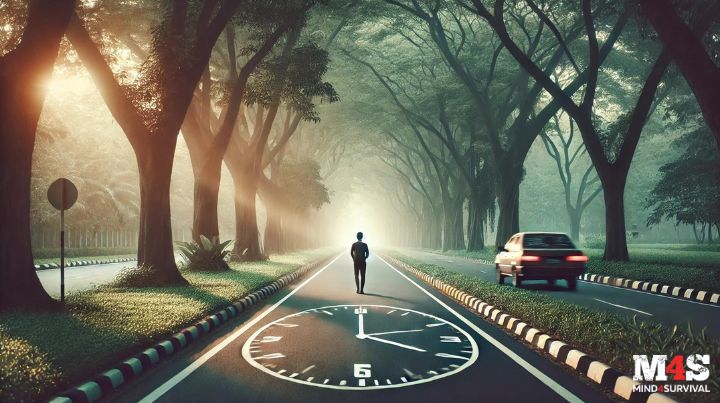Podcast: Play in new window | Download
In this episode of Mind4Survival, I discuss the critical importance of Time and Distance in staying safe and prepared. Whether facing everyday challenges or unexpected emergencies, understanding how to manage these two elements can significantly impact your ability to protect yourself and your loved ones.
Upcoming Events:
Brian will be attending the following events:
- Prepper Camp, Saluda, NC: September 27-29. I will have a booth and will be speaking twice daily—on the Survival Pyramid and Mindset: The Most Important Fundamental of Preparedness. (Link)
- Mountain Readiness Expo’s Fall-Out Event, Harmony, NC: October 18-20. I will speak on Situational Awareness. (Link)
If you’re attending these events, stop by and say hello!
Quick Look at What You’ll Learn
Time and Distance
What Are Time and Distance?
At its core, the concept of Time and Distance involves creating a buffer between yourself and potential threats or problems. The more time you have to react and the more distance you create, the better your chances of staying safe. This applies not only to physical threats but also to mental and emotional situations, giving you space to think and act wisely.
Everyday Situations:
I share practical examples of how to apply the Time and Distance principle in daily life:
- Grocery Shopping: Notice someone acting suspiciously? Create physical distance by moving to another aisle or heading towards the store’s front. This gives you time to assess the situation and avoid potential threats.
- Parking Lot Safety: Choose parking spots close to store entrances to minimize the time and distance between you and safety. More foot and vehicle traffic can also deter potential threats.
Preparedness in Crisis:
In more severe situations like natural disasters, Time and Distance become even more crucial:
- Early Preparation: The sooner you prepare, the more time you have to get to safety. This includes having emergency supplies ready to go, allowing you to avoid last-minute scrambles.
- Food and Water Supplies: By preparing ahead of time, you create a buffer that gives you more time to respond to a crisis without immediate risk to your well-being.
Security and Personal Safety:
When it comes to personal security, Time and Distance are just as essential:
- Home Security: Use security systems, alarms, and lighting to create layers of defense, giving you time to react if an intruder attempts to enter your home.
- Safe Rooms: Having a designated safe room or retreat space can provide critical time and distance in an emergency.
Mental and Emotional Preparedness:
Time and Distance also apply to your mental and emotional state:
- Decision-Making: Taking a moment to breathe and assess your options can lead to better decisions, especially in high-stress situations.
- Emotional Distance: If emotions run high during a confrontation, stepping back and creating emotional distance can help you respond more effectively.
Strategic Preparedness:
From a long-term perspective, consider how Time and Distance affect your overall preparedness plan:
- Multiple Evacuation Routes: Having several routes planned for emergencies gives you time and distance from potential threats.
- Food Storage: Stocking up on essential supplies creates a significant buffer, allowing you to manage crises without immediate concern.
Daily Integration:
I emphasize the importance of integrating Time and Distance into daily life:
- Driving Safety: Leave enough space between your vehicle and others on the road to give yourself time to react.
- Social Interactions: If someone’s behavior makes you uncomfortable, it’s okay to create physical or emotional distance to prioritize your safety.
The Bottom Line on Time and Distance
Time and Distance are about taking control of your safety and preparedness. By being proactive and creating buffers between yourself and potential problems, you position yourself to have the upper hand in any situation. Whether in everyday life, during a crisis, or in your long-term preparedness planning, always think about how to increase the time and distance between you and potential threats.
Remember, the goal isn’t to live in fear but to be ready for whatever comes your way. By applying this concept to your life, you can face challenges with confidence, knowing that you’ve done everything possible to protect yourself and your loved ones.
Stay safe,



